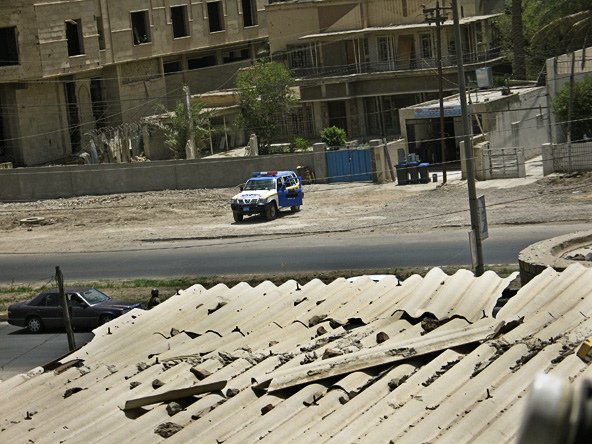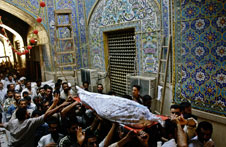
18 June, 2006, Baghdad, Iraq. Iraqi police create a checkpoint on Karrada boulevard. At checkpoints like these, some Sunni families were taken and disappeared. Often, militia members with government jobs were responsible for the killing of Sunnis. It was a mass revenge-taking.
Photo: Phillip Robertson
Revenge
Jul. 13, 2006 | The morgue is set behind a guarded checkpoint that allows access to the health ministry offices, and on this Thursday morning, a day on which many Iraqis celebrate their weddings, the morgue is full, the officer in charge of the gate tells me. At 10 a.m., it has 48 bodies that must be claimed for a trip to Najaf or burial at a large Sunni cemetery near Abu Ghraib prison.
More dead will arrive as stunned and furious men mill around the main checkpoint near the gate, their minds adrift in grief that is already turning into hatred. Many of the men waiting are wearing the familiar black shirts and the thin beards of the Mahdi Army, which means that the morgue, like other government offices, is essentially under militia control. The guards all have obvious affiliations with unofficial armed groups, as do the police.
There are families here claiming their own dead, militiamen claiming comrades, and many of those left alive are naturally thinking about revenge, which will be taken in time by brothers and sons of the deceased. On this nightmarish and ordinary day, most of the people at the gates are Shiites -- an imbalance that stems from the mass executions and bombings employed by Sunni extremists, a terror strategy that reveals their desire to totally annihilate their enemies. It is not a surprise that the morgue is a dangerous place for Sunni families.
The scene at the gates of the health ministry is the alpha and the omega of the Iraqi civil war. The parking lot is packed with cars as Iraqis come from all around Baghdad and its outlying towns to search for bodies. By 10:15 the crowd has grown considerably to number close to a hundred. Some of the men are armed with pistols. One man who is tying a coffin to the roof of a minivan hides his face with a white cloth. White is a potent color in Iraq; it speaks of spiritual purity and a willingness to die. The cloth itself doubles as a mask to keep the stench of the corpse from coming through. The sight reminded me of the shrine of Imam Ali in Najaf during the siege, where dead fighter after dead fighter was carried around the tomb of Ali on the shoulders of his friends, who radiated devotion and religious sacrifice. From one second to the next, it is impossible to know what will happen in this death-charged place.
Three days after the U.S. military killed the Jordanian terrorist leader Abu Musab al- Zarqawi with a pair of well-placed 500-pound bombs near the village of Hibhib, his organization, al-Qaida in Iraq, launched a new offensive, including a mosque bombing, that claimed scores of lives in Baghdad. It was a sign that even if the leader was killed, the well-oiled mechanism of destruction was still running.
Baghdad in the early days of Nouri al-Maliki's government is paralyzed by vehicle bans and long curfews and slipping under the waves of sectarian violence. The city, barricaded by Iraqi soldiers and Americans who man checkpoints at the entrances to each district, is being lost to bloodshed, not won. Neither the fledgling Iraqi state nor the U.S. military has been able to slow down the pace of sectarian killings, and it is clear to everyone who lives here that the authorities are fighting a holding action and not much more.
"I think there will be many more killings of Shiites," a lightly bearded, middle-aged man named Ahmed told me in the restaurant of the Hamra hotel. "This is the time of revenge for al-Zarqawi." Ahmed spoke with the calm precision of a former military officer. He had a strong allegiance to the Mahdi Army and a close family connection with Abu Dereh, a shadowy and infamous Shiite death squad leader I was researching. Abu Dereh was reportedly captured over the weekend by U.S. and Iraqi forces in a bloody raid in Sadr City, although local Iraqis claimed he escaped. Ahmed's son-in-law worked for the death squad leader briefly, assisting with abductions before he was rotated out.
All sorts of rumors and myths circulate about Abu Dereh. One myth has him driving deep into Sunni-held territory in Anbar province and burning entire villages, while another says that he was a refugee of the great marshes in the south, and when Saddam drained them as punishment for the uprisings after the first gulf war, he fled to Sadr City, or Thawra as it was called. Abu Dereh, which means "father of shield" ("shield" is a proper noun in Arabic), is not his real name, it is a nom de guerre. Whenever it was uttered, the Baghdadi who hears it becomes serious and drops his voice so he could not be overheard.
Ahmed gave me an anonymous letter that on June 20 was distributed to seven Sunni mosques in Mansour, written in eloquent Arabic. The writer, a man who called himself Shalshal al Iraqi, titled his missive "The Reaper of al Rusafa." The letter warned Sunnis living in the western half of Baghdad about Abu Dereh and the death squads that were moving through the city. In the letter, Shalshal al Iraqi accuses Abu Dereh of working directly for the Mahdi Army hierarchy. The first paragraph of the letter reads:
"His name is Abu Dereh and he is a professional killer who isn't any less dangerous than al Zarqawi. Abu Dereh is a dangerous criminal who even the Interior Minister fears. Some of the Sadr City police work under his command and other forces from the Sayyid (Moqtada Sadr). Abu Dereh is a wild terrorist and dozens of killers prey behind him. Everyone in Sadr City knows this madman, but they don't say his name, it is whispered in Sadr City when they wake up to the news of blindfolded dead bodies and bodies thrown out at al Seddeh, or on the junkyards of Qasra wah Atash, even in the sewers of Rustumiya, which the Interior Ministry officially made as a place for Abu Dereh's victims. The bodies have been raked by claws."
I managed to make contact with a leader of the Mahdi Army who explained that when he captured Sunnis he suspected of involvement with extremist groups, they were executed. This gave me some insight into the nature of the sectarian and political conflict that was destroying the country.
This story was originally published in Salon.com and edited by Gary Kamiya.
 LEAD IMAGE: Najaf, Iraq, 18 August, 2004. Fighters carry the body of a slain comrade around the tomb of Imam Ali three times, shouting, "There is no god but God." The martyred men are believed to be in paradise where there is no corruption and poverty.
LEAD IMAGE: Najaf, Iraq, 18 August, 2004. Fighters carry the body of a slain comrade around the tomb of Imam Ali three times, shouting, "There is no god but God." The martyred men are believed to be in paradise where there is no corruption and poverty.Photo: Thorne Anderson, Corbis
© Phillip Robertson, 2009-2014.
